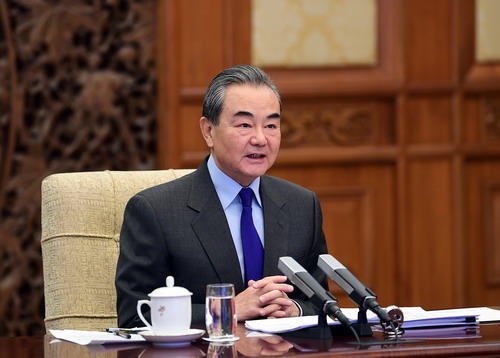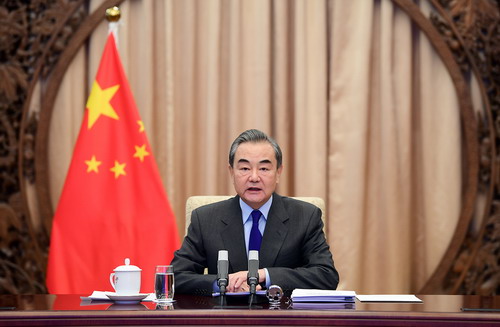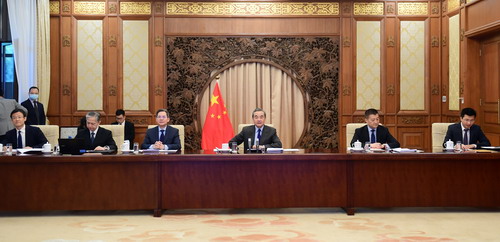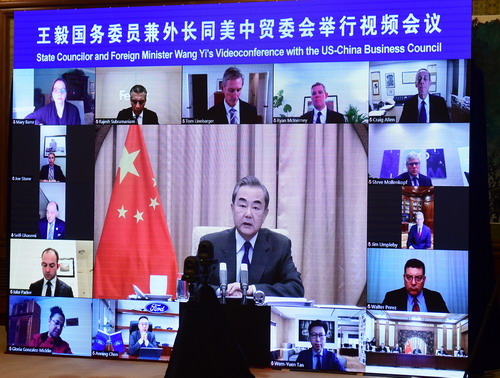
The People’s Republic of China



On December 7, 2020, State Councilor and Foreign Minister Wang Yi held a videoconference with a delegation of board of the US-China Business Council (USCBC) in Beijing.
Wang Yi said, China-US relations are now at a critical historical juncture. In his message to Joe Biden to congratulate him on election as US president, President Xi Jinping noted, "Promoting healthy and stable development of China-US relations not only serves the fundamental interests of the people in both countries, but also meets the common expectation of the international community. I hope that the two sides will uphold the spirit of non-conflict, non-confrontation, mutual respect and win-win cooperation, focus on cooperation, manage differences, advance the healthy and stable development of China-US ties, and join hands with other countries and the international community to promote the noble cause of world peace and development". This is China's proposal and expectation on China-US relations in the next stage, and we hope that this can also become a shared view of more and more far-sighted people in the US. The top priority is that both countries should work together to remove all kinds of disruptions and obstacles and achieve a smooth transition in China-US relations. Moreover, China and the US should work in a direction that serves the common interests of the two countries and peoples, so that the two can resume dialogue, bring relations back on track and rebuild mutual trust for the next stage of bilateral relations.
Wang Yi said, the serious difficulties encountered in China-US relations in recent years are something we do not want to see, and he believes it is also something that all walks of the US society, including the business community, do not want to see. China and the US share a wide range of common interests and broad space for cooperation in spite of differences in history, culture, social system and development path. The international society forms a community which rises and falls together. Thus, all countries should exchange and cooperate with one another rather than decoupling and segmenting, look out for and help one another rather than playing the blame game and passing the buck, and work together to create win-win outcomes rather than conflicting and confronting. As the world's two largest economies and permanent members of the UN Security Council, China and the US should strengthen dialogue and cooperation and make greater contributions to the lasting peace and prosperity of the mankind.

Wang Yi emphasized, the destiny and wellbeing of Chinese and US people and even the people all over the world bears on maintaining the healthy and stable development of the two countries' relations. It is up to the US to make a correct decision on the future of China-US relations, and it is also subject to concerted efforts of the two countries. Wang Yi put forth five proposals on how to promote the healthy and stable development of China-US relations.
First, correcting strategic perceptions. The fundamental cause of the most severe situation in China-US relations since the establishment of bilateral relations lies in the fact that some people on the US side cling to the old-dated Cold War mentality and the ideological prejudice, treat China's development and China-US relations from the zero-sum game point of view, regard China as a rival or even an adversary, attack the system and path chosen by the Chinese people, contain China across the board, or even agitate for "decoupling" and "new cold war". This is a historical, directional and strategic mistake. China always pursues peaceful development for the fundamental purpose of allowing its people to live a better life. Peaceful development has been enshrined into China's Constitution and the Constitution of the Communist Party of China, and has become the will of the country and the mission of the ruling party. We are determined to walk a path of revitalization through win-win cooperation with other countries in our own peaceful development, and to carry out mutually beneficial cooperation with all countries in the world to achieve win-win, joint-win and multiple-win outcomes. For this reason, we expect the US policy toward China to return to objectivity and rationality and also believe this will happen sooner or later.
Second, strengthening communication and dialogue. China and the US should start dialogue at all levels and talk about whatever they want. We could communicate on strategic, global and long-term issues and hold consultations on specific issues to seek breakthroughs and find out solutions, in an effort to achieve outcomes and enhance trust. China's door of dialogue remains open. The two countries can compile a list on dialogue, a list on cooperation and a list on managing differences to chart a clearer course for reorganizing, maintaining and developing China-US relations on a whole. We also encourage the strategic research and business communities of the two countries to strengthen dialogue and exchange, and provide intellectual and social support for the healthy and stable development of China-US relations.
Third, expanding mutually beneficial cooperation. Facing such major global challenges as the wide-spreading pandemic and economic recession, China and the US should work together to show our responsibilities and commitments. It's quite possible for both countries to find entry points of cooperation on fighting against the pandemic, promoting economic recovery and combating climate change. The most pressing task now is to contain the pandemic together. It's necessary for us to cooperate in treatment experience sharing, anti-pandemic supplies manufacturing, and vaccine and drug development. China is ready to support the US's pandemic response within our own capacities. Both sides can enhance economic and trade cooperation, reopen dialogue and coordination on economic policies, keep global industrial and supply chains stable, and support the economic recovery of both countries and the world. Both sides can work together to combat climate change and explore new sources of energy, create a clean and beautiful world, and realize harmonious coexistence between human and nature. Both sides need to promote exchanges on important fields such as military forces, law enforcement, drug control, and cyber security, reinforce coordination on major global challenges and regional hotspot issues such as poverty alleviation, counter-terrorism and non-proliferation, and provide more public goods for the world. Both sides can strengthen cooperation at United Nations, World Health Organization, G20 Group, APEC and other multilateral frameworks to further improve and enhance global governance and push towards a more balanced, inclusive and substantial globalization.
Fourth, managing disputes and conflicts. As the two countries vary in social system, development stage as well as history and culture, it's natural for us to have disputes and different opinions. Mutual respect is the key. We need to respect each other's historical and cultural heritages, respect each other's core interests and major concerns, and respect the system and development path chosen by the people of the other country. China has never interfered with the US's internal affair, exported its own development model or caused any ideological confrontation. The US should follow the rules of international relations, and refrain from interfering with China's internal affairs at its own will and stopping the Chinese people from practicing their rights to a better life. For the conflicts caused by different perceptions, we need to communicate and seek mutual understanding. And for the issues that cannot be solved right away, we need to manage them in a constructive manner, and avoid the effect on the China-US relations caused by escalation of conflicts.
Fifth, improving the public opinions toward each other. China and the US need to support friendly exchanges between legislatures, local governments, businesses, think tanks, colleges, media outlets and youths of the two countries, to enhance mutual understanding and lay a solid foundation for the public opinion of the bilateral relations. People with wisdom and foresight on both sides should send more objective and reasonable messages, fully introduce the realities of China's development and the China-US exchanges and cooperation, eliminate the breeding ground of lies and fake news, enhance mutual understanding of the two peoples and develop correct perceptions of the China-US relations.

We believe that as long as the two sides start from the fundamental interests of the two peoples and people of the world, adhere to mutual respect and common understanding, effectively manage disputes, expand common interests and open up prospects of mutual benefits, the China-US relations will embrace a new start after all the difficulties.
Wang Yi also introduced China's coordinated efforts of pandemic prevention and control and economic and social development. He depicted the blueprint of China's new development paradigm, and answered the questions raised by participating US enterprises.
Wang Yi emphasized that economic and trade cooperation has always been the cornerstone of the China-US relations, and the US business community the stabilizing force for the healthy development of the bilateral relations. He hopes that, in face of the current challenges, the USCBC and the US business community will play their due role in bringing the bilateral relations back on track.
Chairman of Board of USCBC Tom Linebarger, President of USCBC Craig Alen, Chairman of General Motors Mary Barra, Chairman of Air Products Seifi Ghasemi, Chairman of Caterpillar Jim Umpleby, President of Visa Inc. Ryan McInerney, President of FedEx Raj Subramaniam, CEO of Qualcomm Steve Mollenkopf, Executive Vice President of Cargill Joe Stone, President of Chevron China Walter B. Perez, President of Ford China Anning Chen, CEO of Pepsi APAC Wern-Yuen Tan, and Vice Presidents of USBSC Jake Parker and Gloria González-Micklin attended the meeting. The US representatives said that as the most important bilateral relations in the world, sound US-China relations have significant importance to the global economy and international security. The USCBC attaches great importance to the US-China relations and appreciates the recovery of China's economic development which has injected important impetus to the world economic recovery. The US businesses support the both sides in increasing dialogues, rebuilding mutual trust, and bringing the bilateral relations back on track. They also hope to play a bigger role in China's new development paradigm, and wish the new US Administration will take positive measures to bring the bilateral relations back to the right direction. The USCBC is ready to play a positive role for it.



